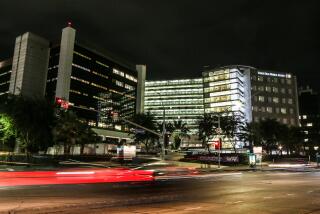300 patients come forward in USC gynecologist misconduct case as LAPD begins investigation
About 300 people have contacted the University of Southern California about a longtime campus gynecologist accused of misconduct as administrators Tuesday began sharing the names of former patients with Los Angeles police for a criminal investigation.
The university declined to say how many of the 300 callers to a dedicated hotline for Dr. George Tyndall’s patients were passed on with patients’ consent to the LAPD, where sex crimes detectives in the Robbery-Homicide Division will take the lead.
Capt. Billy Hayes, who oversees the division, said detectives will triage the investigations in a way similar to how it handled multiple allegations against Hollywood figures such as Harvey Weinstein that flooded the department last year during the height of the #MeToo movement. Some of those cases involved allegations that dated back years, with no physical evidence available.
The LAPD has had discussions with USC and at least one attorney for several alleged victims but has not yet met and received reports from individual patients, Hayes said. Police urged patients to also contact the LAPD directly. The Los Angeles County district attorney’s office said no cases have been presented to prosecutors.
Tyndall, 71, could not be reached for comment Tuesday. But in previous interviews with The Times, he defended his medical exams as thorough, appropriate and in keeping with medical standards. He denied making inappropriate comments to patients or said his remarks were misinterpreted.
“I never had any sexual urges” toward patients, he said in an interview.
Full coverage: USC former gynecologist Dr. George Tyndall accused of inappropriate behavior »
USC administrators also said Tuesday they were cooperating with an inquiry launched by the Medical Board of California, the state agency that licenses and investigates physicians.
The scope of the inquiry by the state medical board is unclear. The agency does not speak publicly about complaints or investigations.
“The medical board is looking very seriously into this, but that is pretty much all I can tell you,” said a board spokeswoman, Susan Wolbarst.
On Tuesday, a state investigator working for the medical board contacted The Times and asked reporters to share information from interviews they conducted with Tyndall. As a policy, The Times does not share unpublished newsgathering material outside the newspaper.
Investigators for the medical board can refer cases to prosecutors and pursue administrative actions against physicians, which can result in the loss of a license to practice. The agency also has the authority to investigate whether healthcare entities met their legal obligations to report doctors.
Laura Sweet, former deputy chief of enforcement at the medical board, said the agency is likely to pursue an investigation of USC while they collect evidence of Tyndall’s patient care.
“They have to be looking at both,” said Sweet, who retired in 2015.
Elected officials and medical board administrators have long said they believe there is significant underreporting of physician misconduct in California by hospitals and clinics, and have pressed healthcare entities to do more to protect the public.
“This case plays directly into that concern,” Sweet said.
Under state law, hospitals and many clinics must notify the medical board in a variety of circumstances when they suspend, discipline or terminate the privileges of physicians. These reports are taken very seriously by the medical board because they come from trained health professionals, and health professionals face steep fines for failing to notify the board.
“If a hospital or clinic takes actions against a physician, the medical board needs to know,” said Julie Fellmeth, a law professor at the University of San Diego and former enforcement monitor for the medical board.
USC contends that the law didn’t apply in Tyndall’s case because the complaints against him “were made as a human resources matter” and the university was not governed by the state reporting laws.
The university has said that “in hindsight,” officials should have filed a complaint against Tyndall after he separated from the university in 2017. The university said it filed a belated report in March after learning that Tyndall sought to be reinstated.
The report was made a month after The Times began approaching clinic employees about the doctor.
More to Read
Sign up for Essential California
The most important California stories and recommendations in your inbox every morning.
You may occasionally receive promotional content from the Los Angeles Times.













